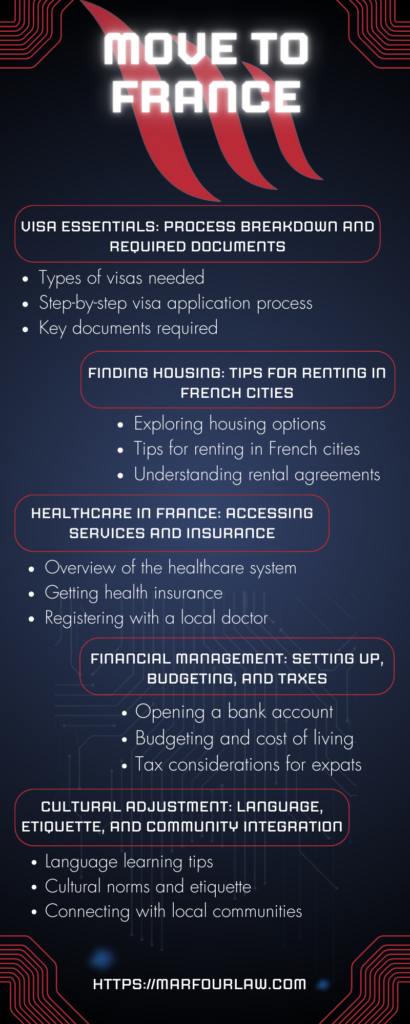Move to France as an American is an exciting yet complex journey that involves several crucial steps. From understanding visa requirements and exploring dual nationality options with Spain to deciding between living in Spain vs the USA and pursuing French citizenship, each aspect of the move needs careful planning and consideration.
This comprehensive guide aims to simplify the process, providing you with all the essential information you need to make your transition to living in France smooth and stress-free.

Living in France as an American: Understanding Dual Nationality with Spain and France
Dual nationality allows an individual to hold citizenship in two countries simultaneously. Obtaining dual nationality with Spain can provide additional benefits for Americans looking to live in France. This guide explores the legal frameworks, advantages, considerations, and the step-by-step application process for securing dual nationality in Spain and France.

Legal Frameworks and Requirements:
- Spain: To become a Spanish citizen, Americans typically need to reside in Spain for a specified period, which is generally ten years. However, there are exceptions; for example, individuals married to Spanish citizens may apply after just one year of residency.
Applicants must also demonstrate their integration into Spanish society, which includes passing language and cultural exams. The residency requirement can be reduced to five years for refugees and two years for nationals from certain countries, such as Latin American nations, Andorra, the Philippines, Equatorial Guinea, Portugal, or individuals of Sephardic origin.
- France: France permits dual nationality, allowing individuals to hold French citizenship alongside another nationality. Americans must reside in France for at least five years and show their integration into French society.
This includes demonstrating proficiency in the French language and having knowledge of French culture and societal norms. Applicants must pass a language test (typically at level B1) and provide evidence of their social integration through community activities, employment, or other social engagements.
Benefits of Dual Nationality:
- Unrestricted Travel: Having dual nationality with Spain and France allows seamless travel within the European Union (E.U.) and the Schengen Area without visa restrictions. This means dual nationals can move freely between these countries for travel, work, and residency. The ability to travel without needing visas or dealing with immigration controls simplifies cross-border movement and enhances personal and professional opportunities.
- Social Benefits: As a dual national, you gain access to social benefits in both countries. This includes public healthcare systems, which are highly regarded in both Spain and France and provide comprehensive medical services.
- Work and Residence Rights: Dual nationals have the right to live and work in Spain and France without needing additional permits or facing restrictions that apply to non-citizens. This legal status opens up a broader range of employment opportunities and provides flexibility in choosing where to live.
It also means you can own property, start a business, or engage in professional activities in both countries without legal barriers.
Considerations for Americans:
- Tax Implications: Dual nationality can complicate tax obligations. As a dual national, you may be required to file taxes in Spain and France and fulfill your tax obligations as a U.S. citizen. Understanding the tax treaties between these countries is crucial to avoid double taxation. Consulting with a tax professional specializing in international tax law can help you navigate these complexities and ensure compliance with all tax regulations.
- Cultural Integration: Adapting to Spain and France’s cultural norms and societal expectations is essential for successful integration. This includes learning the local languages, understanding social etiquette, and participating in community activities. Embracing cultural differences and becoming actively involved in the local community will help you build social connections and feel more at home in both countries.
- Legal Protections: Dual nationals benefit from legal protections and rights in Spain and France. This includes the right to legal representation, protection against discrimination, and the ability to seek assistance from both governments if needed. Understanding your rights and responsibilities as a dual national is essential to ensure you can fully benefit from the legal safeguards provided by both countries.
Application Process:
- Steps to Dual Nationality: The application process for dual nationality involves several key steps. Firstly, you must fulfill the residency requirements by living in Spain and France for the required periods. Next, you must demonstrate language proficiency by passing language tests in Spanish and French. You must also provide evidence of your social integration, such as community involvement, employment, and social connections. Gathering the necessary documents, including proof of residency, language certificates, and integration evidence.
Finally, you must submit your application to the relevant authorities in Spain and France, ensuring all paperwork is completed and submitted within the specified deadlines.
- Consultation and Legal Advice: Given the complexity of the dual nationality application process, seeking advice from immigration lawyers or professionals specializing in dual nationality can be beneficial.
These experts can provide tailored advice, help with document preparation, and ensure compliance with all legal requirements. Consulting with professionals can increase the likelihood of a successful application by helping you navigate the bureaucratic processes and avoid common pitfalls.
Comparing Spain vs. USA: Factors to Consider When Choosing Your New Home
When deciding between living in Spain or the USA, several essential factors can significantly impact your lifestyle, finances, and overall quality of life. Evaluating these factors will help you make an informed decision based on your preferences and priorities.

Lifestyle Contrasts: What to Expect in Spain vs. the USA
- Cultural Differences: Spain is known for its relaxed and leisurely pace of life, emphasizing socializing, family, and enjoying life’s simple pleasures. The Spanish “siesta” culture, where businesses close for a few hours in the afternoon, exemplifies this laid-back lifestyle. In contrast, the USA often has a more fast-paced and work-centric culture, with longer working hours and a greater focus on productivity and individual achievement. Understanding these cultural differences can help you decide which environment better suits your lifestyle preferences.
- Social Life and Community: In Spain, social life often revolves around community and family. People gather in public squares, enjoy long meals together, and participate in local festivals and traditions. The sense of community is strong, and social interactions are typically warm and inviting. In the USA, while community and family are important, there is often a greater emphasis on individualism. Social interactions can vary widely depending on the region, but relationships are generally more transient, with people frequently moving for work or personal reasons.
- Work-Life Balance: Spain places a high value on work-life balance, with laws that support ample vacation time and shorter working hours compared to the USA. Spaniards typically enjoy long lunch breaks and prioritize time with family and friends.
In contrast, the work culture in the USA can be more demanding, with fewer vacation days and longer working hours. Americans often prioritize career advancement and financial success, sometimes at the expense of personal time and relaxation.
Cost of Living and Economic Considerations
- Housing Costs: One of the most significant factors to consider is the cost of housing. In Spain, housing is generally more affordable than in many parts of the USA. Whether renting or buying, you will likely find more budget-friendly options in Spanish cities and rural areas. However, prices can vary significantly between regions, with cities like Madrid and Barcelona being more expensive. In the USA, housing costs can also vary widely, but cities such as New York, San Francisco, and Los Angeles tend to have higher housing prices than Spanish cities.
- Healthcare: Spain’s public healthcare system is highly regarded for its quality and affordability. Residents have access to universal healthcare, which covers most medical services at low or no cost. Healthcare is often privatized in the USA, and while the quality can be high, the costs are typically much higher. Health insurance is necessary, and out-of-pocket expenses can be significant.
- Cost of Living: The overall cost of living in Spain is generally lower than in the USA. This includes groceries, dining out, transportation, and other daily expenses. In Spain, you can often enjoy a high quality of life at a lower cost. The cost of living in the USA can be higher, particularly in major cities. However, salaries in the USA also tend to be higher, which can offset some of the higher living costs.
Economic Opportunities:
Spain’s economy has been recovering from past financial crises, and there are opportunities in various sectors, mainly tourism, technology, and renewable energy. However, the job market can be competitive, and unemployment rates have historically been higher than in the USA. The USA offers a diverse and robust job market with opportunities across many industries, including technology, finance, healthcare, and entertainment. Wages are generally higher, but the cost of living and healthcare expenses can offset some of these financial benefits.
Guide to French Citizenship for Americans: Eligibility, Process, and Benefits
Becoming a French citizen offers numerous advantages, including the right to live, work, and travel freely within the European Union. This guide provides a comprehensive overview for Americans interested in obtaining French citizenship, covering eligibility criteria, the application process, and the benefits of becoming a French national.

Determining Your Eligibility for French Citizenship
- Residency Requirements: To be eligible for French citizenship, Americans must legally reside in France for at least five consecutive years. This residency period can be reduced to two years for those who have completed higher education in France or contributed significantly to French culture, science, or the arts. Additionally, individuals married to French citizens can apply after four years of marriage, provided they have lived together in France for at least three years.
- Language Proficiency: Applicants must demonstrate proficiency in the French language. This usually involves passing a French language test at level B1 on the Common European Framework of Reference for Languages (CEFR), which assesses their ability to understand and communicate effectively in French.
- Integration into French Society: Another key eligibility requirement is demonstrating integration into French society. This includes showing knowledge of French culture, values, and societal norms. Applicants may be asked to provide evidence of their integration, such as participation in community activities, employment in France, or other forms of social involvement.
- Good Moral Character: French authorities require applicants to have a clean criminal record and good moral character. This includes respecting French laws and societal values. Any criminal convictions or severe legal issues can negatively impact your application.
Step-by-Step Guide to Applying for French Citizenship
Gather Required Documents:
The first step in the application process is to gather all necessary documents. These typically include:
- A valid passport
- Proof of legal residency in France (such as a residence permit)
- Birth certificate (translated into French if necessary)
- Marriage certificate (if applicable)
- Proof of language proficiency (such as a language test certificate)
- Evidence of integration into French society (such as employment records or community involvement)
- Police clearance certificate
- Submit Your Application: Once you have gathered all the required documents, you can submit your application for French citizenship at your local prefecture (government administrative office) in France. Ensure that all forms are completed accurately and all documents are included to avoid delays in processing your application.
- Attend the Interview: After submitting your application, you will be scheduled for an interview with French authorities. The interview assesses your integration into French society and commitment to becoming a French citizen. Be prepared to discuss your reasons for seeking citizenship, your experiences living in France, and your understanding of French culture and values.
- Please wait for Approval: The processing time for French citizenship applications can vary, but it typically takes several months to a year. Your application will be reviewed during this period, and background checks will be conducted. You may be asked to provide additional information or attend follow-up interviews if necessary.
- Receive Your Citizenship Certificate: Once your application is approved, you will receive a French citizenship certificate. This certificate formalizes your new status as a French citizen. You will then be eligible to apply for a French passport and enjoy all the rights and privileges of French citizenship.
Benefits of French Citizenship
- Freedom to Live and Work in the E.U: As a French citizen, you have the right to live, work, and travel freely within the European Union. This opens up numerous opportunities for employment, education, and travel across 27 member states without the need for visas or work permits.
- Access to Social Services: French citizens benefit from comprehensive social services, including high-quality healthcare, education, and social security. France’s public healthcare system is renowned for its quality and affordability, ensuring access to medical care for all citizens.
- Political Participation: French citizenship grants you the right to vote in national and local elections and the opportunity to run for public office. This allows you to participate fully in the democratic process and have a say in the country’s governance.
- Security and Stability: Becoming a French citizen provides security and stability, with the protection and rights granted by one of the world’s leading democracies. French citizenship also offers the ability to pass citizenship to your children, securing their future opportunities and rights.
Moving to Paris as an American: Practical Tips for a Smooth Transition
Moving to Paris from the United States requires careful planning and preparation to ensure a smooth transition. This guide provides practical tips to help Americans settle into Paris, covering essential aspects such as finding housing, navigating healthcare, and accessing education systems.

Finding Suitable Housing in Paris
Finding accommodation in Paris can be challenging due to high demand and varying neighborhood characteristics. Begin your search by exploring reputable real estate websites and contacting local agencies that specialize in expatriate housing. It’s advisable to start searching well before your move date to secure a suitable apartment or house that meets your needs and budget.
Consider neighborhoods based on proximity to work or school, amenities, and safety. Popular expat-friendly areas include the Marais, Saint-Germain-des-Prés, and the 16th arrondissement. Renting in Paris typically requires a security deposit, proof of income or financial stability, and sometimes a guarantor (such as a resident or employer).
For detailed assistance with navigating French rental laws or understanding lease agreements, consult Marfour Law, an international law firm specializing in expatriate legal services in France. Marfour Law can provide expert guidance throughout the housing search and rental process, ensuring compliance with local regulations and protecting your legal interests.
Navigating Healthcare and Education Systems in Paris
Understanding the French healthcare system is crucial for new residents. France offers universal healthcare coverage through its public system, ensuring access to quality medical services. As an expatriate, you may need to register with the French social security system to access healthcare benefits. Private health insurance may also be advisable to cover additional medical expenses or specialized care.
Exploring educational options is essential for families relocating to Paris. Paris boasts a range of international schools offering English or other language curricula catering to expatriate families. Research schools in advance, considering location, curriculum, extracurricular activities, and admissions requirements.
Marfour Law provides comprehensive legal support for expatriates moving to Paris, including assistance with healthcare registration, navigating educational choices, and ensuring compliance with French immigration and residency laws. Visit Marfour Law for more information on their services tailored to international clients.
By planning ahead and leveraging expert guidance from Marfour Law, legal professionals specializing in expatriate services, Americans can confidently navigate the complexities of moving to Paris and ensure a successful and seamless transition.
FAQs
Do Americans need a visa to visit France for short stays?
Americans can only visit France and other Schengen Area countries with a visa for up to 90 days within a 180-day period for tourism, business, or family visits.
What types of long-stay visas are available for Americans Move to France?
The main types of long-stay visas include work visas, student visas, family visas, and retirement visas. Each type has specific requirements based on the purpose of your stay.
What documents are needed to apply for a long-stay work visa?
Required documents typically include a work contract, proof of your qualifications, evidence of sufficient financial resources, and authorization from the French Ministry of Labor obtained by your employer.
How can I apply for a long-stay student visa?
To apply for a long-stay student visa, you need proof of enrollment in a recognized French institution, sufficient funds to support yourself, health insurance, and proof of accommodation.
Can I bring my family with me if I move to France for work?
You can apply for a family visa to bring your spouse and dependent children. You must provide proof of your relationship, your legal status in France, and evidence of financial support and accommodation.
Conclusion
Move to France as an American opens doors to a culturally rich experience and access to Europe’s vibrant lifestyle. Whether planning a short-term visit or a long-term relocation, understanding the visa requirements and residency options is crucial.
From short-term tourist visas to long-stay permits for work, study, or retirement, each option offers unique benefits and requires thorough preparation. Once settled, you’ll enjoy advantages like top-tier healthcare, educational opportunities, and a high quality of life.
Embracing French culture and integrating into local communities will enrich your experience, fulfilling and rewarding your journey to France.

